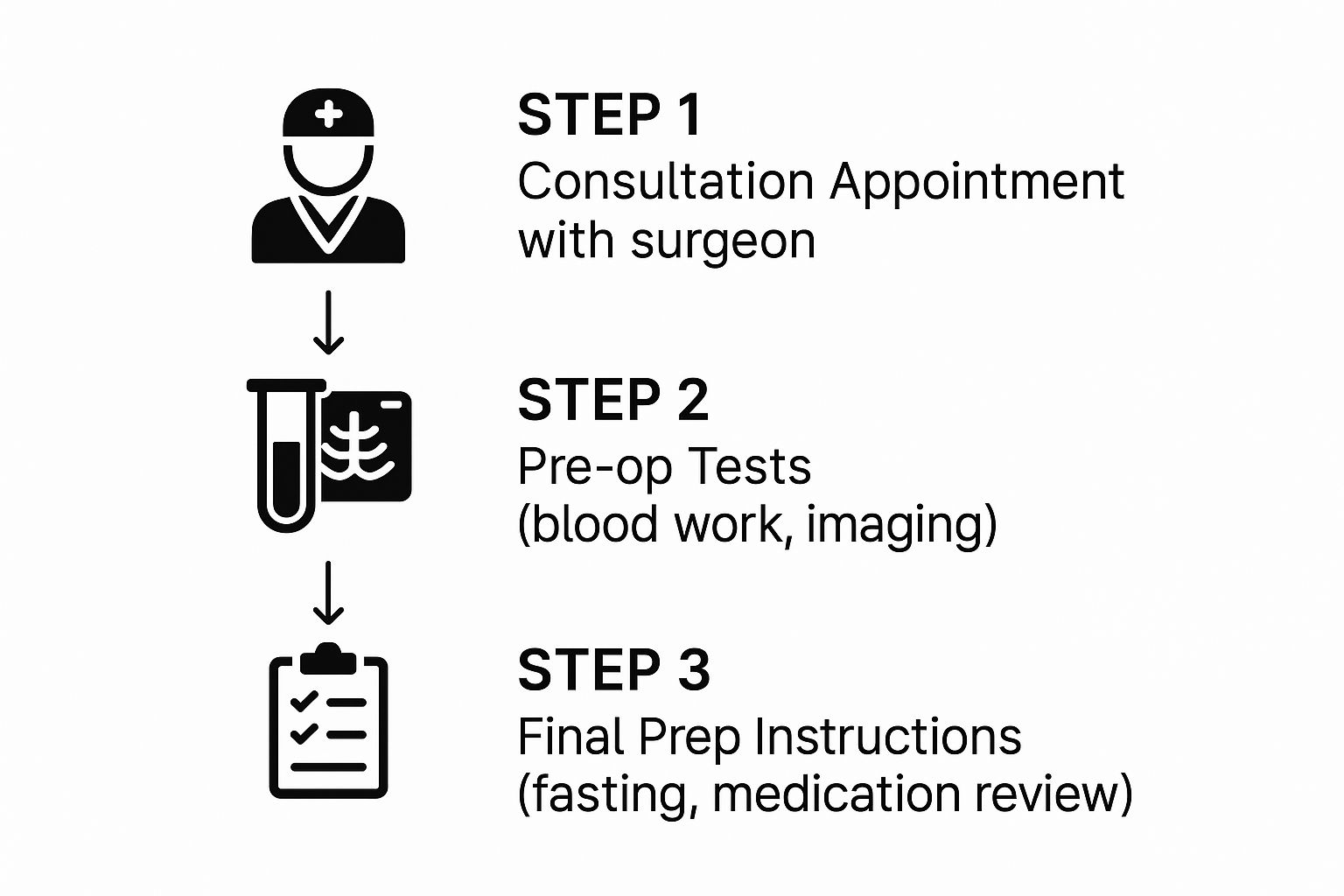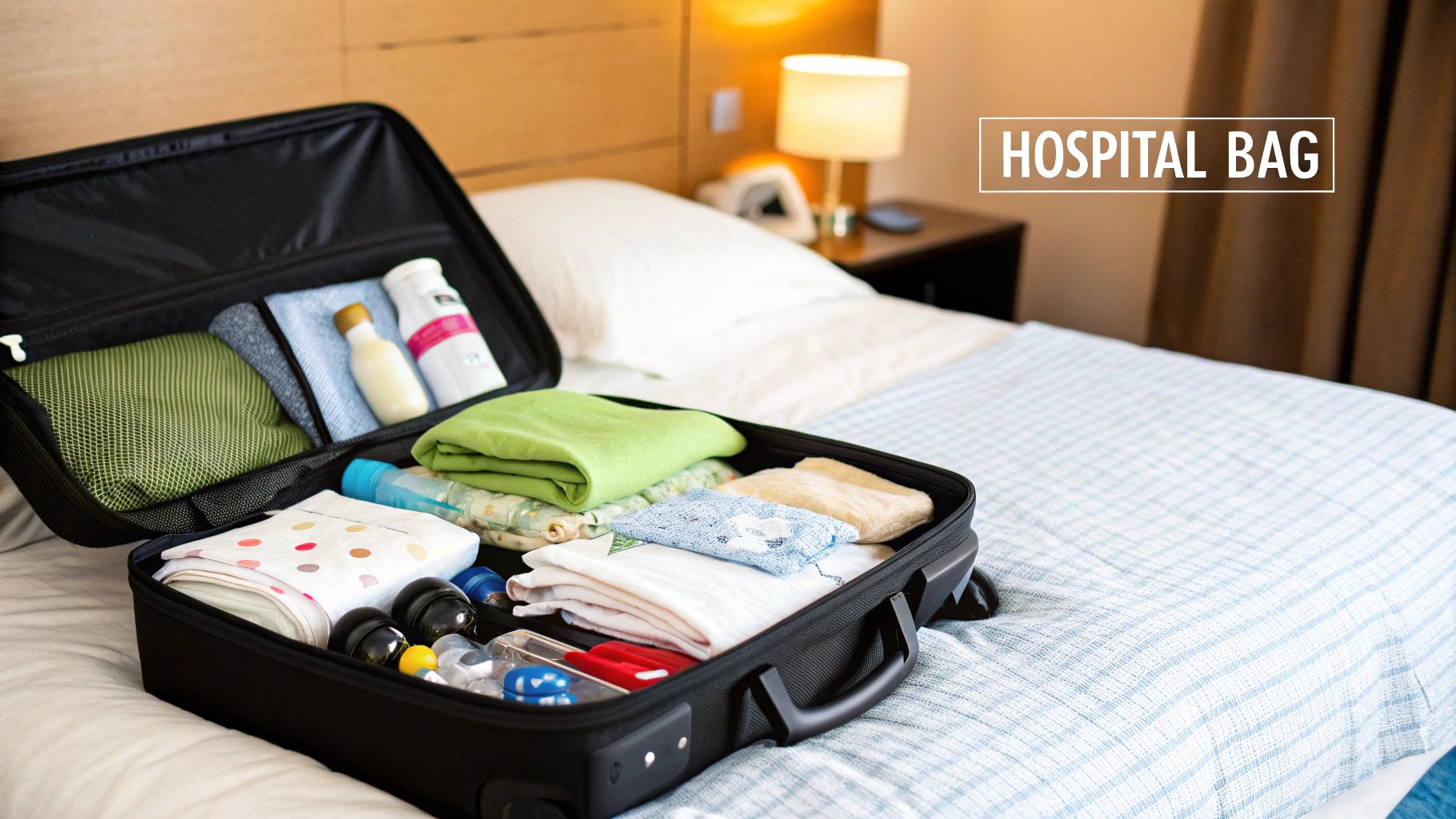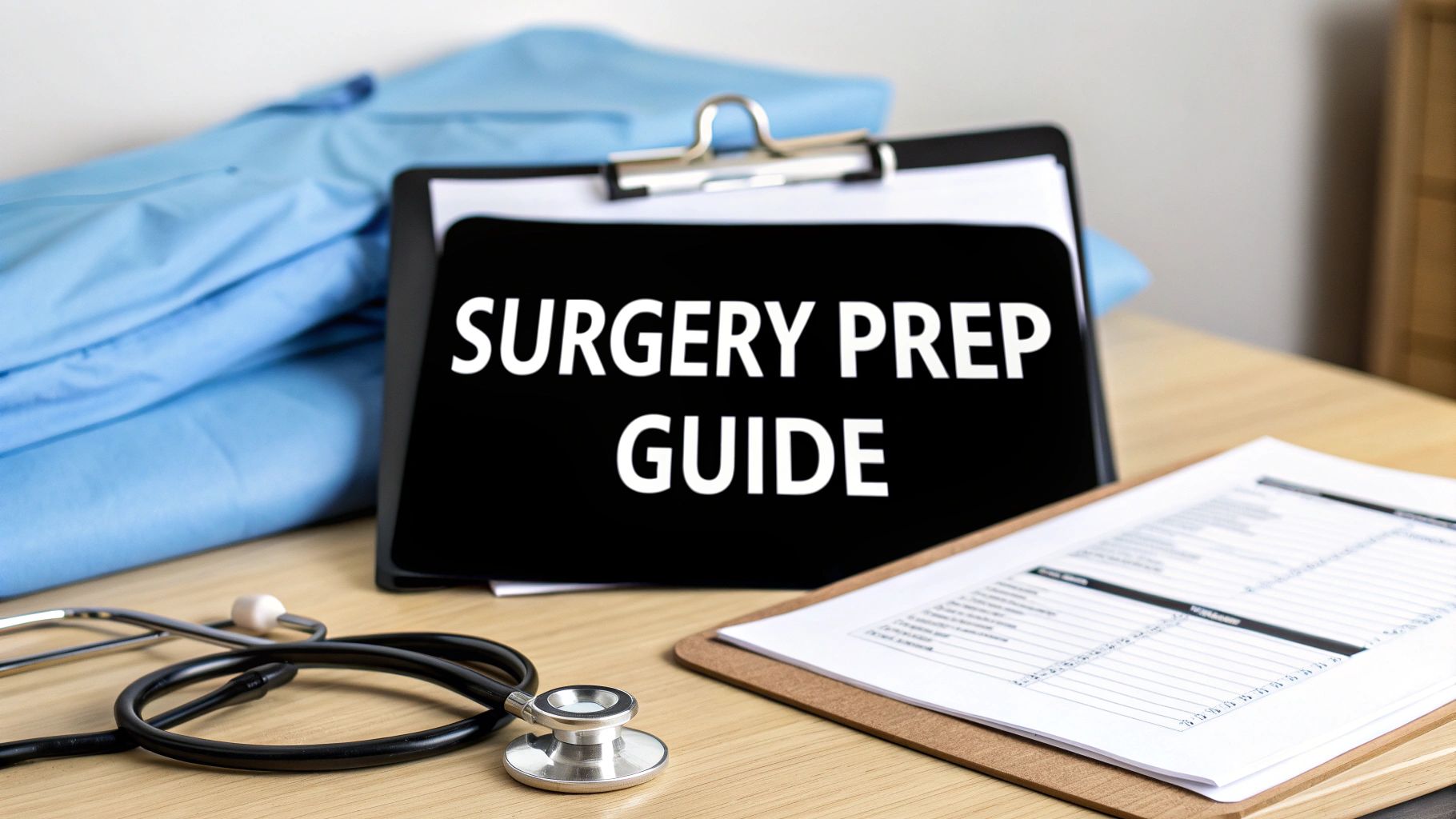.webp)
Getting ready for surgery isn’t just about the day itself. It’s a process of taking organised, deliberate steps to get yourself physically, logistically, and mentally prepared. It means working closely with your medical team, tweaking a few lifestyle habits, and setting up a comfortable space to recover in.
Think of it this way: a clear plan is your best tool for turning anxiety into confidence. It smooths out the entire journey, from your first consultation to your trip home.
Facing surgery can feel overwhelming, but breaking it down into a clear roadmap makes it far more manageable. This is your central guide, covering everything from those initial chats with your surgeon to the final checks before you leave for the hospital. The goal is to move forward calmly and methodically, knowing every essential detail is taken care of.
This kind of proactive approach is becoming more common. After all, surgical care is a huge part of healthcare in England. It's estimated that 60% of people will have at least one procedure in their lifetime, and with about one in ten people in the UK having surgery each year, knowing how to prepare is more relevant than ever. You can discover more about these trends in the NHS Hospital Episode Statistics.
A successful surgical outcome starts long before you ever see an operating theatre. I find it helps to group your preparations into four main areas:
The infographic below gives a great visual of the typical medical steps you'll go through after that first consultation.

This flow chart shows the critical sequence of events, from your surgeon's appointment to the final checks. Each step is designed to maximise your safety and ensure you’re in the best possible shape for a successful outcome.
To make things even clearer, here is a quick summary of the key areas to focus on.
This table breaks down the core areas to focus on when preparing for your upcoming surgery.
This checklist isn't exhaustive, but it provides a solid framework. By tackling these areas systematically, you'll feel much more in control as your surgery date approaches.
Think of your preoperative assessment as the dress rehearsal before the main event. It's a crucial appointment with one primary goal: to confirm you're medically fit for surgery and anaesthesia. This isn't just a box-ticking exercise; it's a vital safety check giving the clinical team a complete picture of your health.
For many, this appointment helps demystify the whole process and is a fantastic opportunity to ask questions. Understanding what’s involved allows you to become an active participant in your care, which is always the best way to ensure everything runs smoothly.

You’ll most likely meet with a specialist nurse who will run through a series of checks and questions. The aim is to spot any potential risks well in advance and manage them proactively.
You can typically expect a combination of the following:
This process is so important because it helps prevent last-minute delays or cancellations. In fact, research shows just how key these assessments are to improving surgical outcomes across the UK.
A study of over 8,000 surgical cases in England found that 7.3% were postponed after the preoperative assessment. This highlights how critical this step is for flagging issues early on. You can discover more insights from the NHS trusts analysis on PubMed.
Depending on your age, the type of surgery you’re having, and your general health, you might need a few routine tests. These are standard procedures designed to give your anaesthetist and surgeon the data they need.
Some common tests include:
These tests provide a clear baseline of your health, allowing the team to tailor the anaesthesia and your care plan specifically to you. For instance, if you're having a gynaecological procedure, these results help create a personalised approach; you can learn more about the patient journey for conditions like ovarian cysts on our information page.
Coming prepared can make the assessment much smoother and more effective. It puts you more in control and ensures the clinical team gets all the information they need from you.
Here’s a quick checklist of what to bring:
Being open and honest is absolutely essential. Sharing details about lifestyle factors like smoking or alcohol consumption isn't about judgement; it's about understanding things that can affect anaesthesia and how your body heals. With a complete picture, your medical team can give you the safest and best possible care.
Think of your body as a high-performance machine getting ready for a demanding event. Giving it the right fuel and conditioning beforehand can make a world of difference to how it performs during and after surgery. This is about more than just showing up on the day; it’s about actively participating in your own recovery.
In the weeks leading up to your procedure, a few targeted actions can massively improve your resilience. By focusing on nutrition, gentle movement, and following your medical team's advice to the letter, you’re setting up your body’s systems to handle the stress of surgery and the healing process that follows.
What you eat directly impacts how your body heals. A well-nourished body has all the essential building blocks it needs for tissue repair, a strong immune response, and good energy levels. This isn’t about a drastic diet, but rather making small, consistent choices that really add up.
Your goal is simple: create a balanced plate that provides a steady supply of nutrients crucial for recovery.
Making these small nutritional tweaks is a straightforward way to contribute to a better outcome.
Good nutrition isn't just a "nice-to-have"; it's a fundamental part of your preparation. Studies consistently show that patients with a good nutritional status before an operation often experience fewer complications and a quicker return to their daily lives.
While strenuous activity is definitely off the table, gentle movement can be incredibly beneficial. The key is to improve your circulation and lung function, which helps prevent common post-op complications like blood clots and chest infections.
Always have a chat with your doctor before starting any new activity. They can recommend safe exercises based on your specific surgery and current fitness level. For many, this simply means adding more walking into their day.
A short, brisk walk each day can boost your cardiovascular health without putting any undue strain on your body. Think of it as waking up your circulatory system so it's primed and ready to support the healing process.
If you smoke, there is no single better thing you can do for your surgical outcome than to stop. Smoking restricts blood flow, effectively starving healing tissues of the oxygen they desperately need. This can lead to much higher infection rates and a slower, more difficult recovery.
Stopping smoking even a few weeks before surgery can make a measurable difference. The NHS offers fantastic free resources to help you quit, and your GP is there to provide support. It's also wise to reduce your alcohol intake, as it can interfere with anaesthesia and other medications.
Your preoperative team will give you a very specific set of instructions covering your medications, fasting, and sometimes even skincare. These aren't just suggestions—they are critical safety protocols designed to protect you.
You will be told exactly which medications to continue and which to stop. For example, blood-thinning medications like aspirin or warfarin often need to be paused to reduce the risk of bleeding. On the other hand, you may be told to take essential blood pressure medication with a tiny sip of water on the morning of your surgery. Never make these decisions on your own.
It's vital to discuss any and all treatments you're taking with your clinical team. For instance, if you're exploring options for managing pain, it's worth understanding the latest guidance on treatments such as medical cannabis from a specialist clinic and how this might interact with your surgical plan. Full transparency is essential.
The instruction to have "nil by mouth" is one of the most important you'll receive. An empty stomach is essential to prevent the risk of aspiration—where stomach contents could enter your lungs while you're under anaesthesia. This is a very serious but completely preventable complication.
Your instructions will be precise, often detailing different cut-off times for food and clear fluids. Follow them exactly to ensure your surgery can go ahead safely and without any last-minute delays.
Your emotional state plays a massive role in how you approach surgery and recovery. It’s completely normal to feel a mix of emotions, from apprehension to outright fear. The key is acknowledging these feelings and developing practical strategies to manage them, transforming anxiety into a sense of calm control.
Feeling informed is one of the best ways to prepare. When you understand the process, you remove the fear of the unknown. Knowledge empowers you to face the day with confidence, not uncertainty.

Many people share similar concerns when facing an operation. Just voicing these worries is the first step toward addressing them. You are certainly not alone if you’re thinking about any of these common fears.
A few frequent concerns include:
Recognising that these fears are normal allows you to tackle them head-on. This proactive approach is a vital part of preparing effectively for surgery.
You don’t need complex methods to manage pre-surgery stress. Simple, focused techniques can have a profound impact, helping to ground you when your thoughts start to spiral.
One of the most effective tools is controlled breathing. When you feel anxious, your breathing often becomes shallow and quick. Deliberately slowing it down sends a powerful signal to your brain to relax.
Try this simple exercise:
This practice can be done anywhere, anytime you feel a wave of anxiety creeping in. If you're looking for other ways to foster mental resilience, you might find it beneficial to explore the science-backed insights on Ashwagandha for stress relief.
"Your mindset is not just a passenger on this journey; it is the driver. A calm, informed, and positive outlook can directly influence your body's ability to heal by reducing stress hormones and promoting a state of rest and repair."
Never underestimate the importance of talking it out. Sharing your feelings with your support network—be it your partner, a close friend, or a family member—can lift a huge weight from your shoulders.
Equally important is an open dialogue with your medical team. Your surgeon and anaesthetist are there to answer every single one of your questions, no matter how small they seem.
Writing down your questions before an appointment ensures you don’t forget anything in the moment. Feeling heard and understood by your clinical team is one of the most effective ways to build trust and alleviate fear. By actively engaging in these conversations, you become a partner in your own care.
A smooth recovery doesn't start the moment you leave the hospital—it begins weeks before, with thoughtful planning. Getting your home and life organised in advance means you can put all your energy into healing, not worrying about the small stuff. It’s your logistical checklist for a calm, comfortable, and stress-free return.
This preparation is more crucial than ever, especially as more procedures are now done as day cases. While this minimises your hospital stay, it puts the responsibility squarely on you to have a solid home recovery plan sorted out from day one.

First things first: pick a spot in your home and make it your recovery hub. This isn’t about redecorating; it’s about creating a comfortable, easily accessible space where you can rest without needing to get up constantly. A sofa in the living room or a bed on the ground floor often works perfectly.
Once you’ve chosen your spot, bring everything you might need within arm's reach. This simple act saves so much frustration and unnecessary strain later.
Your recovery station should include:
Another vital but often overlooked task is clearing the pathways. Tidy up clutter, secure any loose rugs, and tuck electrical cords away safely. This minimises the risk of trips or falls, which is especially important if you’ll be using crutches or a walker.
Thinking ahead about meals and daily chores is an absolute game-changer. The last thing you'll feel like doing is cooking or running to the shops while you're recovering.
In the weeks leading up to your surgery, start prepping simple, healthy meals that you can freeze. Soups, stews, and pasta sauces are fantastic options. It’s also a good idea to stock your pantry with easy-to-prepare foods like porridge, tinned goods, and long-life milk.
Don't be afraid to ask for help. Friends and family genuinely want to support you, but they often don't know how. Give them specific, actionable tasks, like picking up groceries, walking the dog, or just popping in for a chat.
For more complex procedures, you might consider professional support. Looking into home care services for specific surgeries like hip replacement can offer tailored assistance. This ensures you have the right support, whether you’re recovering from major surgery or a minimally invasive treatment like radiofrequency ablation.
Getting your life admin sorted is just as important as preparing your home. Tying up loose ends beforehand allows you to properly switch off and rest without those nagging worries.
Let your employer know about your surgery and expected recovery time well in advance. Set up an out-of-office email and delegate any urgent tasks. It's also smart to automate any bill payments that will be due while you're out of action.
If you have children or pets, make sure their care is arranged. Line up help from your partner, family, or friends to handle school runs, meals, and walks. A clear schedule gives everyone peace of mind.
Packing your hospital bag is the final piece of the puzzle. You don't need to bring the kitchen sink, but a few well-chosen items can make your stay much more comfortable.
Here’s a comparison to help you pack efficiently for your hospital stay, whether it's for a day case or a longer admission.
By taking these practical steps, you’re not just preparing your house; you’re building a supportive environment that lets you focus on what truly matters: your health and a smooth, stress-free recovery.
As your surgery date gets closer, it’s completely normal for a flurry of last-minute questions to come to mind. Getting clear answers isn’t just about ticking boxes on a checklist; it’s about giving you peace of mind. Knowing what to do in different scenarios makes those final few days feel far less stressful and much more under control.
We've pulled together some of the most common queries we hear from patients. Tackling these head-on will help you feel fully informed and ready for a smooth experience.
This is a big one, and rightly so. If you come down with a cold, cough, fever, or any new illness in the days leading up to your operation, your very first step should be to contact your surgeon's office or the preoperative assessment team immediately.
Don't just wait it out and hope for the best. Even a seemingly minor illness can increase the risks associated with anaesthesia, especially for your breathing and heart. The clinical team needs to know what’s going on so they can make an informed decision. They'll assess whether it's safe to proceed or if it's better to postpone until you've recovered. A delay can feel frustrating, but your safety is always the number one priority.
This is another critical point that needs absolute clarity, which you should have received during your preoperative assessment. You will be given very specific instructions on which regular medications to take and which to stop. Never make this decision on your own.
For instance, you'll almost certainly be asked to stop taking blood-thinning medications (like aspirin or warfarin) several days beforehand to reduce bleeding risk. On the other hand, you will likely be told to continue essential medicines, like those for high blood pressure, taking them with just a tiny sip of water on the morning of surgery. Following this guidance to the letter is vital to avoid any serious complications or a last-minute cancellation.
The hospital will give you strict fasting instructions, often called being 'nil by mouth'. This isn't a suggestion; it’s a crucial safety rule.
Typically, you'll be told to stop eating solid food about six hours before your procedure and to stop drinking clear fluids (like water or black tea) about two hours before. But these timings can vary, so always stick to the exact instructions you are given. The reason behind this is to make sure your stomach is empty. This prevents the dangerous risk of stomach contents entering your lungs while you're under anaesthesia, a complication known as aspiration. If you have a condition like diabetes, you'll get special, tailored advice on managing your food and insulin.
Following your fasting instructions precisely is one of the most important things you can do for your own safety. If you eat or drink after the specified cut-off, your surgery will almost certainly be postponed.
Thinking ahead to your return home is one of the best things you can do for yourself. A little bit of prep now can make your recovery so much more comfortable and safe. The aim is to create a space where you can focus completely on healing.
First, set up a ‘recovery station’ where you plan to spend most of your time. This might be the sofa in the living room or a bed moved to the ground floor.
Think about any mobility aids you might need, like a shower chair or a grabber tool. And don't hesitate to ask a friend or family member to be on standby for errands, looking after a pet, or just for some company in those first few days. Sorting these logistics out now removes a huge source of stress later on.
At The Vesey, our commitment is to provide exceptional, patient-centred care from your initial consultation through to your full recovery. If you have any further questions or wish to discuss your upcoming procedure, please visit our website for more information. https://www.thevesey.co.uk
Article created using Outrank

